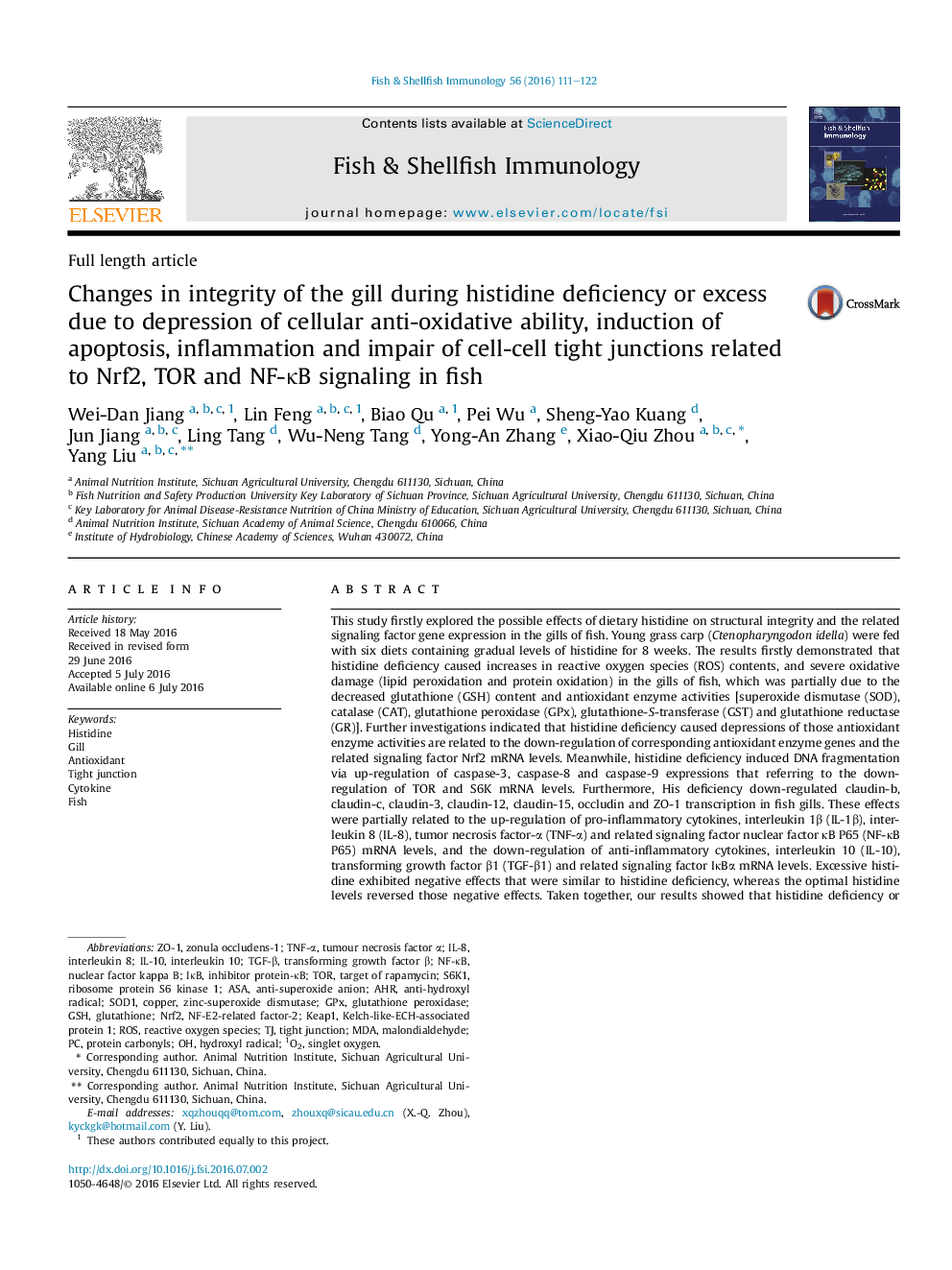| کد مقاله | کد نشریه | سال انتشار | مقاله انگلیسی | نسخه تمام متن |
|---|---|---|---|---|
| 8499017 | 1553618 | 2016 | 12 صفحه PDF | دانلود رایگان |
عنوان انگلیسی مقاله ISI
Changes in integrity of the gill during histidine deficiency or excess due to depression of cellular anti-oxidative ability, induction of apoptosis, inflammation and impair of cell-cell tight junctions related to Nrf2, TOR and NF-κB signaling in fish
دانلود مقاله + سفارش ترجمه
دانلود مقاله ISI انگلیسی
رایگان برای ایرانیان
کلمات کلیدی
ZO-1IκBIL-10SOD1S6K1GPXGSHIL-8Nrf2ASA1O2Kelch-like-ECH-associated protein 1TORAHRMDANF-κBTGF-βkeap1 - buy1ROS - ROSAntioxidant - آنتی اکسیدانTight junction - اتصال تنگSinglet oxygen - اکسیژن مجزاInterleukin 10 - اینترلوکین 10Interleukin 8 - اینترلوکین 8Transforming growth factor β - تبدیل فاکتور رشد βtumour necrosis factor α - تومور نکروز عامل αHydroxyl radical - رادیکال هیدروکسیلCytokine - سیتوکینNF-E2-related factor-2 - فاکتور 2 مربوط به NF-E2TNF-α - فاکتور نکروز توموری آلفاnuclear factor kappa B - فاکتور هسته ای کاپا Bmalondialdehyde - مالون دی آلدهیدFish - ماهیcopper, zinc-superoxide dismutase - مس، روی-سوپراکسید دیسموتازZonula occludens-1 - نوار ابزار بسته 1target of rapamycin - هدف از رپامایسینhistidine - هیستیدینProtein carbonyls - پروتئین کربونیلGlutathione - گلوتاتیونglutathione peroxidase - گلوتاتیون پراکسیدازReactive oxygen species - گونههای فعال اکسیژنGill - گیل
موضوعات مرتبط
علوم زیستی و بیوفناوری
علوم کشاورزی و بیولوژیک
علوم آبزیان
پیش نمایش صفحه اول مقاله

چکیده انگلیسی
This study firstly explored the possible effects of dietary histidine on structural integrity and the related signaling factor gene expression in the gills of fish. Young grass carp (Ctenopharyngodon idella) were fed with six diets containing gradual levels of histidine for 8 weeks. The results firstly demonstrated that histidine deficiency caused increases in reactive oxygen species (ROS) contents, and severe oxidative damage (lipid peroxidation and protein oxidation) in the gills of fish, which was partially due to the decreased glutathione (GSH) content and antioxidant enzyme activities [superoxide dismutase (SOD), catalase (CAT), glutathione peroxidase (GPx), glutathione-S-transferase (GST) and glutathione reductase (GR)]. Further investigations indicated that histidine deficiency caused depressions of those antioxidant enzyme activities are related to the down-regulation of corresponding antioxidant enzyme genes and the related signaling factor Nrf2 mRNA levels. Meanwhile, histidine deficiency induced DNA fragmentation via up-regulation of caspase-3, caspase-8 and caspase-9 expressions that referring to the down-regulation of TOR and S6K mRNA levels. Furthermore, His deficiency down-regulated claudin-b, claudin-c, claudin-3, claudin-12, claudin-15, occludin and ZO-1 transcription in fish gills. These effects were partially related to the up-regulation of pro-inflammatory cytokines, interleukin 1β (IL-1β), interleukin 8 (IL-8), tumor necrosis factor-α (TNF-α) and related signaling factor nuclear factor κB P65 (NF-κB P65) mRNA levels, and the down-regulation of anti-inflammatory cytokines, interleukin 10 (IL-10), transforming growth factor β1 (TGF-β1) and related signaling factor IκBα mRNA levels. Excessive histidine exhibited negative effects that were similar to histidine deficiency, whereas the optimal histidine levels reversed those negative effects. Taken together, our results showed that histidine deficiency or excess impaired the structural integrity of fish gill by disrupted fish antioxidant defenses and regulating the expression of tight junction protein, cytokines, apoptosis, antioxidant enzymes, NF-κB p65, IκBα, TOR, Nrf2, Keap1 and apoptosis-related genes in the fish gills.
ناشر
Database: Elsevier - ScienceDirect (ساینس دایرکت)
Journal: Fish & Shellfish Immunology - Volume 56, September 2016, Pages 111-122
Journal: Fish & Shellfish Immunology - Volume 56, September 2016, Pages 111-122
نویسندگان
Wei-Dan Jiang, Lin Feng, Biao Qu, Pei Wu, Sheng-Yao Kuang, Jun Jiang, Ling Tang, Wu-Neng Tang, Yong-An Zhang, Xiao-Qiu Zhou, Yang Liu,